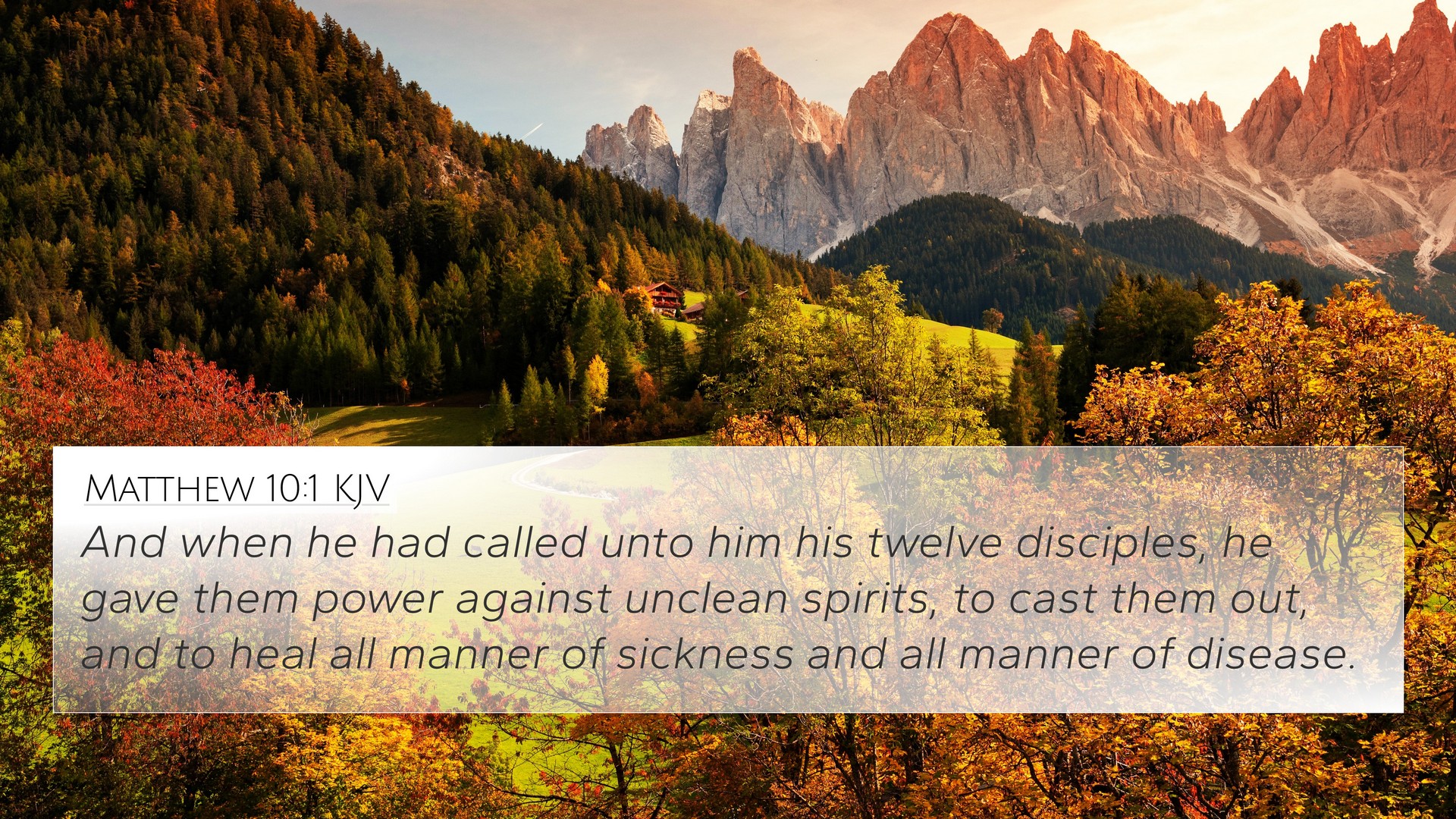Understanding Matthew 10:1
The verse, Matthew 10:1, states:
"And when he had called unto him his twelve disciples, he gave them power against unclean spirits, to cast them out, and to heal all manner of sickness and all manner of disease."
Summary and Insights
This verse marks a pivotal moment in the ministry of Jesus as He empowers His disciples for the work ahead. Below we explore the insights derived from public domain commentaries, which illuminate the meaning and implications of this passage.
Empowerment of the Disciples
Matthew Henry emphasizes that through calling His disciples, Jesus not only acknowledges their importance but also instills a sense of authority in them. This empowerment is critical as it sets the foundation for their future ministry and lays the groundwork for the church.
Adam Clarke highlights that the "power" given to the disciples signifies an escalation of their mission. They are equipped with the divine authority necessary to confront spiritual adversaries and to perform miraculous healings, showcasing the recognition of their vital role in spreading the Gospel.
Albert Barnes notes that the mention of "unclean spirits" signifies the casting out of demonic influences, underscoring the authority of Jesus over evil. This act serves as a testament to the work of salvation and liberation that Jesus offers, both through His disciples and ultimately through Himself.
Context and Thematic Connections
The empowerment of the disciples in Matthew 10:1 connects strongly with various themes throughout the Bible, most notably the authority of Jesus, the mission of His followers, and spiritual warfare. Here are several cross-references that enhance our understanding:
- Luke 9:1-2 - Similar to Matthew 10:1, where Jesus gives His disciples power and authority over demons and to cure diseases.
- Mark 6:7 - Jesus sends out His disciples in pairs, giving them authority over unclean spirits.
- Acts 1:8 - The empowerment for witnessing extends the theme of authority to the larger body of believers beyond the original twelve.
- John 14:12 - Promises that believers will perform greater works, establishing the continuity of divine empowerment.
- James 5:14-15 - The practice of healing the sick emphasizing the continuation of the disciples' mission in the church age.
- Matthew 28:18-20 - The Great Commission, reinforcing the authority given to disciples to spread the Gospel to all nations.
- 2 Corinthians 10:4 - Speaks of the weapons of our warfare, contextualizing spiritual authority in a broader sense beyond physical illness.
Linking Biblical Texts: A Comparative Study
This verse can also be examined through the lens of comparative Bible verse analysis. For example, the empowerment of the disciples in Matthew 10:1 aligns with various prophesies and accounts of empowerment of servants of God throughout the Scriptures:
- Exodus 4:10-17 - God's empowerment of Moses to confront Pharaoh links the Old Testament's theme of divine calling and equipping to the New Testament.
- Isaiah 61:1 - Prophetic foreshadowing highlights the anointing for mission work, mirroring Jesus’ empowerment of His disciples.
Tools for Bible Cross-Referencing
To effectively analyze and interpret passages like Matthew 10:1, it is beneficial to utilize Bible reference resources and tools designed for Bible cross-referencing. These tools help in understanding:
- How to find cross-references in the Bible, aiding in deeper insights.
- Bible cross-reference guides provide structured methods for finding connections.
- Cross-reference Bible study enhances thematic exploration and understanding.
Final Thoughts
Matthew 10:1 serves not only as a historical account of Jesus empowering His disciples but also emphasizes the ongoing theme of divine authority and mission that resonates throughout the Biblical narrative. The connections between Bible verses reveal a rich tapestry woven throughout Scripture, speaking of God’s purpose and empowerment in the lives of believers.
As you study this verse, consider the broader implications of God’s empowerment and the connections to other scriptural texts. This approach fosters a deeper understanding of the inter-Biblical dialogue and themes that permeate God's Word.

























